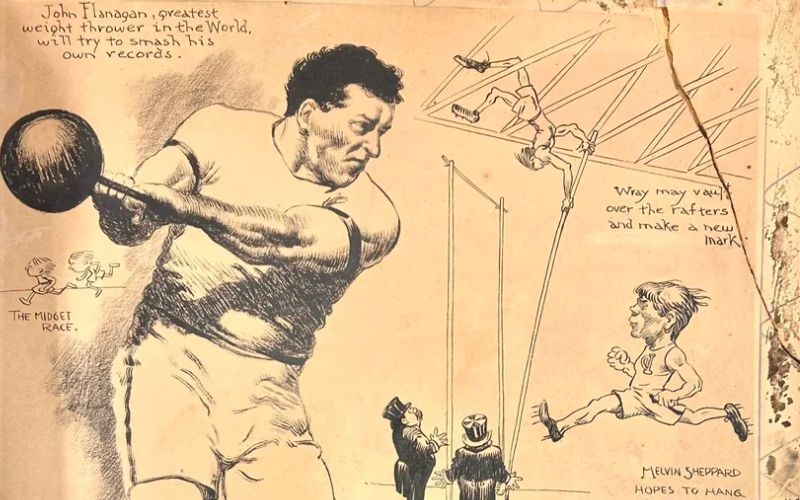The swallows are back.
A flitting halo of lissome beauty over the emerging spring, I saw them on the second day of April where I always see them first. It is high over my neighbor Jimmy White's house across the road.
There were seven of them and, as I watched joyfully, I reflected I have been here in Carhue now for long enough to say with authority that not alone did I know their grandparents but also, given the unerring homing instincts of swallows, I also bred several of them in the sheds behind the cottage.
I'm not a sentimental man, but this sight, which I faithfully record for ye every year, always means something very special to me. I invariably manage to produce one salty tear from the corner of my left eye!
Yahoo! is what I say to myself as I wipe that tear away. Yahoo! The winter of our discontent is truly banished into history, and the brighter times have arrived.
YAHOO!
Incidentally, in the spirit that is in it, do something nice for me. My very good friend and neighbor Jimmy White of the first swallows' house has been patiently going through a couple of very hard health weeks. Jimmy lives in a wheelchair and has been in agony from a trapped nerve in his neck that has been causing severe headaches.
He normally lives behind the widest smile in all Ireland, but that has been wiped away recently. He is not a complaining man, a hard worker and a brilliant gardener (shaming all his neighbors!), but we can see what he is undergoing at present.
Will one or two of you good people out there lay hands on an Easter card and post it to him and his lovely wife Joanne at Cleenagh, Newmarket on Fergus, Co. Clare, Ireland? It will make his day.
I recall making this request just once before in this space, for my late sister Maura some years ago, and her delight at the cards she received from all over the states totally brightened her days.
Jimmy will be smiling again soon, well able to abuse me every day (as I do to him also) but a couple of cards and well wishes will speed up that process. Remember him next time you write.
He's a good man. They are good people. Thanks.
I had a lovely interview two days ago with a special farmer from Mullagh in West Clare that some of you will know not as a farmer at all, but as a very special balladeer and songwriter. His name is PJ Murrihy, a lively and flamboyant man, and he occupies a special niche in the musical world so precious to us all.
If it could be said of me that much of what I write comes from an Ireland that, though still vital, is being overwhelmed by the styles of the New Ireland, then it is far more valid to say that PJ Murrihy, in a whole raft of wholesome songs and ballads, many penned by himself, keeps the memories of that Ireland melodiously alive both at home and abroad.
And it is beautiful that he has never been busier than he is just now.
I met him in Spanish Point the other afternoon on his way back from another full house in Kerry the previous night. The Mullagh farmer, after years as the featured singer with the fabled Kilfenora Ceili Band, is the true voice nowadays of rural Ireland.
He is, for example, the voice that perennially rings over the amazing National Ploughing Championships with songs like “The Man in His Field With His Horses and Plough” and “The Old Threshing Mill,” and “Put More Turf On the Fire Mary Ann,” all songs reflecting the disappearing old farming practices, but all still as popular as ever.
And “The Rambling House” with its big turf fires and set dancing and stories round the hearth. And “My Father's House” in which we were all so very young long ago.
For those of you born in Ireland, the voice of PJ Murrihy is one of those special voices that fronted the ceili bands when they were playing old time waltzes and foxtrots.
Rich, tenorish, twirled around a Clare accent, it is as evocative a sound as that of the Irish American tenors engaging with "Danny Boy." Know what I mean?
But his signature song has still to be “Pat Murphy's Meadow” in the sunny long ago. And I laughed when PJ told me the story of that ballad. Because that famous meadow is not in Ireland at all but in Newfoundland!
The lonesome lyrics were first crafted in the thirties, as a poem, by an emigrant called Devine, later converted into a ballad by Irish entertainers in Chicago, and it was there, about the early eighties, that PJ heard an old lady sing it at a party.
He brought it back home to Clare with him, and the rest is musical history. He has to sing it every night, everywhere he goes.
I say to him that he has made more money mowing “Pat Murphy's Meadow” than Pat Murphy ever made as a farmer!
He has 10 or 12 CDs to his credit now, many of them featuring ballads he wrote himself such as the local one called “Lusitania Survivor.” That's a good yarn.
One of his neighbors growing up was a lady called Jane Hogan who survived the Lusitania sinking (by a German U Boat) in 1915. Jane spent eight hours in the sea after the sinking (she'd been on her way home to Mullagh from the states) but made it safely to Queenstown after being rescued, took the train to Ennis, and WALKED the 21 miles home to Mullagh.
Later she married Mick Moroney of Mullagh and was an elderly lady when PJ was growing up nearby. Now her story is another fragment of music lore created by a beloved entertainer still going strong as ever.
I ask him how he manages to combine a musical career with farming. He tells me that he solved that problem years ago.
He runs a beef suckler herd on his 50 seaside acres. And he sells the calves at the end of each year.
"In the meantime they do the milking for me!” he says.
We have an entertaining hour or two together in Spanish Point. The Logues of the Bellsbridge Hotel are so delighted to see him in the house that they stand us our lunch of luscious bangers and mash.
Old Ireland is still alive and kicking!
Further proof of that is that PJ presents me with a mighty apple tart baked by his wife Mary -- an old friend of mine -- to fortify me for when I get home. That, now, is old-style courtesy and hospitality.
The threshing mills and rambling houses and plough horses may be of the past, but not at all the culture of which they were part.
Yahoo!
A flitting halo of lissome beauty over the emerging spring, I saw them on the second day of April where I always see them first. It is high over my neighbor Jimmy White's house across the road.
There were seven of them and, as I watched joyfully, I reflected I have been here in Carhue now for long enough to say with authority that not alone did I know their grandparents but also, given the unerring homing instincts of swallows, I also bred several of them in the sheds behind the cottage.
I'm not a sentimental man, but this sight, which I faithfully record for ye every year, always means something very special to me. I invariably manage to produce one salty tear from the corner of my left eye!
Yahoo! is what I say to myself as I wipe that tear away. Yahoo! The winter of our discontent is truly banished into history, and the brighter times have arrived.
YAHOO!
Incidentally, in the spirit that is in it, do something nice for me. My very good friend and neighbor Jimmy White of the first swallows' house has been patiently going through a couple of very hard health weeks. Jimmy lives in a wheelchair and has been in agony from a trapped nerve in his neck that has been causing severe headaches.
He normally lives behind the widest smile in all Ireland, but that has been wiped away recently. He is not a complaining man, a hard worker and a brilliant gardener (shaming all his neighbors!), but we can see what he is undergoing at present.
Will one or two of you good people out there lay hands on an Easter card and post it to him and his lovely wife Joanne at Cleenagh, Newmarket on Fergus, Co. Clare, Ireland? It will make his day.
I recall making this request just once before in this space, for my late sister Maura some years ago, and her delight at the cards she received from all over the states totally brightened her days.
Jimmy will be smiling again soon, well able to abuse me every day (as I do to him also) but a couple of cards and well wishes will speed up that process. Remember him next time you write.
He's a good man. They are good people. Thanks.
I had a lovely interview two days ago with a special farmer from Mullagh in West Clare that some of you will know not as a farmer at all, but as a very special balladeer and songwriter. His name is PJ Murrihy, a lively and flamboyant man, and he occupies a special niche in the musical world so precious to us all.
If it could be said of me that much of what I write comes from an Ireland that, though still vital, is being overwhelmed by the styles of the New Ireland, then it is far more valid to say that PJ Murrihy, in a whole raft of wholesome songs and ballads, many penned by himself, keeps the memories of that Ireland melodiously alive both at home and abroad.
And it is beautiful that he has never been busier than he is just now.
I met him in Spanish Point the other afternoon on his way back from another full house in Kerry the previous night. The Mullagh farmer, after years as the featured singer with the fabled Kilfenora Ceili Band, is the true voice nowadays of rural Ireland.
He is, for example, the voice that perennially rings over the amazing National Ploughing Championships with songs like “The Man in His Field With His Horses and Plough” and “The Old Threshing Mill,” and “Put More Turf On the Fire Mary Ann,” all songs reflecting the disappearing old farming practices, but all still as popular as ever.
And “The Rambling House” with its big turf fires and set dancing and stories round the hearth. And “My Father's House” in which we were all so very young long ago.
For those of you born in Ireland, the voice of PJ Murrihy is one of those special voices that fronted the ceili bands when they were playing old time waltzes and foxtrots.
Rich, tenorish, twirled around a Clare accent, it is as evocative a sound as that of the Irish American tenors engaging with "Danny Boy." Know what I mean?
But his signature song has still to be “Pat Murphy's Meadow” in the sunny long ago. And I laughed when PJ told me the story of that ballad. Because that famous meadow is not in Ireland at all but in Newfoundland!
The lonesome lyrics were first crafted in the thirties, as a poem, by an emigrant called Devine, later converted into a ballad by Irish entertainers in Chicago, and it was there, about the early eighties, that PJ heard an old lady sing it at a party.
He brought it back home to Clare with him, and the rest is musical history. He has to sing it every night, everywhere he goes.
I say to him that he has made more money mowing “Pat Murphy's Meadow” than Pat Murphy ever made as a farmer!
He has 10 or 12 CDs to his credit now, many of them featuring ballads he wrote himself such as the local one called “Lusitania Survivor.” That's a good yarn.
One of his neighbors growing up was a lady called Jane Hogan who survived the Lusitania sinking (by a German U Boat) in 1915. Jane spent eight hours in the sea after the sinking (she'd been on her way home to Mullagh from the states) but made it safely to Queenstown after being rescued, took the train to Ennis, and WALKED the 21 miles home to Mullagh.
Later she married Mick Moroney of Mullagh and was an elderly lady when PJ was growing up nearby. Now her story is another fragment of music lore created by a beloved entertainer still going strong as ever.
I ask him how he manages to combine a musical career with farming. He tells me that he solved that problem years ago.
He runs a beef suckler herd on his 50 seaside acres. And he sells the calves at the end of each year.
"In the meantime they do the milking for me!” he says.
We have an entertaining hour or two together in Spanish Point. The Logues of the Bellsbridge Hotel are so delighted to see him in the house that they stand us our lunch of luscious bangers and mash.
Old Ireland is still alive and kicking!
Further proof of that is that PJ presents me with a mighty apple tart baked by his wife Mary -- an old friend of mine -- to fortify me for when I get home. That, now, is old-style courtesy and hospitality.
The threshing mills and rambling houses and plough horses may be of the past, but not at all the culture of which they were part.
Yahoo!




Comments